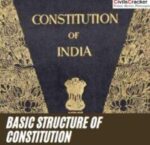
Union and Its Territory(Part – 1 of the Constitution) | Indian Polity notes
The first part of the Indian Constitution contains Articles 1 to 4. It deals with the Indian Union and its territories.
Home » UPSC Study Materials » CivilsCracker Explains » Indian Polity Detailed Notes » Preamble of the Indian Constitution | Indian Polity notes
Read in detail about the Preamble of our constitution
The Preamble of the Constitution of India is an introductory statement of 73 words which highlights the objectives, essence, core values and principles of the constitution.

The first part of the Indian Constitution contains Articles 1 to 4. It deals with the Indian Union and its territories.

The concept of ‘Basic Structure of Constitution’ derives its origin from the landmark judgment of Supreme Court of India given in ‘Kesavananda Bharati vs State of Kerala case of 1973.

An Indian citizen residing outside India for a total of at least 183 days in a financial year is considered to be a NRI.

The Regulating Act of 1773 was the first step taken by the British Parliament to regulate the affairs of the East India Company in India.